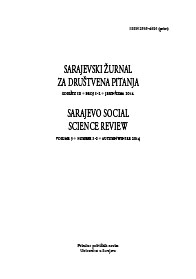Normativna moć: Europska prošlost ili budućnost EU?
Normative Power: European Past or the Future of EU?
Author(s): Nedžma Džananović MiraščijaSubject(s): Civil Society, Governance, EU-Approach / EU-Accession / EU-Development, Geopolitics
Published by: Fakultet političkih nauka - Univerzitet u Sarajevu
Keywords: normative capacity; normative force; EU; EU’s foreign policy;
Summary/Abstract: The EU’s favoring of the international norms and tendency towards the universalization of its own particularity is rooted in European history, but also has its utterly current and pragmatic reasons. If international standards are to be less explicit or less rigorous then EU standards, that might bring competitive advantage to other subjects on the international scene. Chronic lack of so-called hard-power needed to impose its norms to subjects not willing to accept or respect them, forces EU to rely on the international system to realize its interests. The Union recognizes the export of the norms as a need, interest and commitment, therefore the political discourse on normative power seems to be essential dimension of EU strategy of the power demonstration on the international scene. Analysis of the EU’s legislative potential, however, points to the serious inadequacy of this concept since it doesn’t recognize the difference between the power of defining norms that EU clearly has, and the power to impose them as a standard acceptable to others. Time-space configuration that forms the international norms is extremely unfavorable for EU, and its normative potential is not universal, nor far-reaching, and only occasionally and indirectly goes beyond EU borders and countries covered by the enlargement process.
Journal: Sarajevski žurnal za društvena pitanja
- Issue Year: III/2014
- Issue No: 1-2
- Page Range: 195-208
- Page Count: 14
- Language: Bosnian

